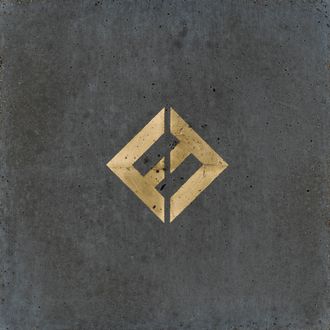
For a long time, it’s been hard to say something new about the Foo Fighters. When a band isn’t all that interested in saying something new itself, it seems the critics can only follow suit. Still, the story, much-repeated, holds some power: Having witnessed the collapse of mainstream rock firsthand as the drummer for Nirvana, Dave Grohl decided, in the wake of Kurt Cobain’s suicide, to form a band that would sound and act like grunge, and everything that grunge’s triumph and implosion implied, had never happened. In the irony-poisoned desert of the ’90s, Grohl was an oasis of sincerity and straightforwardness. In effect, the band was the voice of a much-overlooked constituency: earnest, well-meaning Gen-Xers.
From the outset, the Foo Fighters presented themselves as a vital but sanitized history or an alternate timeline. They would carry on the heritage of classic rock as if rock’s decadence and self-destructive tendencies were incidental and not intrinsic. Such a revisionist project would have been easy enough to mock, but in keeping with the underdog spirit of Grohl’s lyrics, every time we were prepared to count the band out, they would land a haymaker, a song so sweetly perfect that mockery seemed not just superfluous but sacrilegious. Time and time again, tracks like “Big Me,” “My Hero,” “Learn to Fly,” “Times Like These,” “Best of You,” or “The Pretender” would burst through the membrane of blandness always threatening to close in on them. If rock was dead elsewhere and in suspended animation on their lesser songs, their hits were as vital and viscerally compelling as anything Grohl’s musical heroes had ever crafted. And then there was “Everlong,” a 1997 love song for which the words “sweetly perfect” seemed an understatement. If even a quarter of their songs were on its level, rock music would never have slipped out of the cultural mainstream.
As things actually stood, though, it was hard not to feel some measure of frustration with the band. Their steady oscillation between anodyne filler (most of the songs on any given album) and glorious triumph (a few of the songs on any given album) ensured that permanent greatness, for them, remained ever possible and ever out of reach. The Fighters never changed, but the rest of the world was accelerating toward strange, mostly digital frontiers. They were as ill-equipped for the constant need for novelty demanded by the internet as they were well-suited for the standard record-industry playbook; besides, millennials were all listening to rap anyway.
But time comes for everyone, even for a band so firmly committed to being wholesome and nice. It simply won’t do, in 2017, to pretend that things are exactly how they used to be. Released today, Concrete and Gold, the Foo Fighters’ ninth album, looks out over desolate spaces. Grohl’s lyrics are, by his standard, uncommonly topical. You can hear him declaring that there’s “trouble to the right and left” and asking what side you’re on on “The Sky Is a Neighborhood,” a song inspired by a Neil DeGrasse Tyson YouTube video; “Dirty Water” references the Flint water crisis, mixing the metaphor of “heavy metal” with the lead in the pipes and announcing that “I’m a natural disaster.” The sound, though always executed with great competence, is intentionally and collectively haphazard. The loungy funk of “Sunday Rain” launches unexpectedly (but effectively) into a wall-of-sound chorus, and there’s no real line running from the dynamic churn of the early, Soundgarden-esque “Make It Right” to the Sabbath-like dirges of the album closer and title track.
The clean but defiant tone familiar to Foo Fighters fans, though still recognizable, has been rendered muddy and a bit accusatory, sometimes to forceful effect. “Run” channels verses of political anxiety into a collective-minded, rousing hook: “Wake up, run for your life with me.” “Happily Ever After (Zero Hour)” is a gallery of grunge-worthy images of decay and abandonment; it’s jarring to hear the singer of “My Hero” announce “There ain’t no superheroes / They’re underground.” “The Line” makes fighting for “our lives” seem lovely and grand. High-profile guests like Justin Timberlake, Boyz II Men’s Shawn Stockman, Paul McCartney (playing drums?!) are absorbed into the mix without much ceremony: tilt your head and the band’s homogenizing tendencies seems like the brave presentation of a unified front in the face of a foe that remains unnamed.
As Lana Del Rey’s Lust for Life and today’s self-titled debut of Prophets of Rage (a supergroup of Rage Against the Machine, Public Enemy, and Cypress Hill members) show, there’s been a certain tendency this summer toward musical revivalism with a political bent. More-liberal artists, faced with the naked, full-spectrum revisionism of the right, are straining to assemble a politically conscious lineage of their own and attempting, with mixed results, to link their struggle to that of the vaguely defined “resistance.” Grohl and company fit this pattern more surely than most. If they don’t sound too different from their former selves, it’s because they’ve been stitching together the sounds of the past into something viable, but not entirely relevant, for decades. Like any other pop musicians not aligned with the far right, they’re harmless, but it’s not entirely impossible that they might help achieve something positive. It’s as vexing as it is unavoidable to know that, in an uncertain time, only time will tell what such efforts will amount to.




